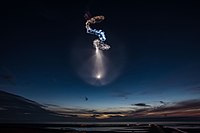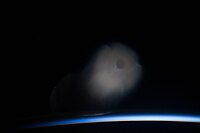Space jellyfish
A space jellyfish (also jellyfish UFO or rocket jellyfish) is a rocket launch-related phenomenon caused by sunlight reflecting off the high-altitude rocket plume gases emitted by a launching rocket during morning or evening twilight. The observer is in darkness, while the exhaust plumes at high altitudes are still in direct sunlight. This luminous apparition is reminiscent of a jellyfish.[1][2][3] Sightings of the phenomenon have led to panic, fear of nuclear missile strike, and reports of unidentified flying objects.[4][5][6][7][8][9]
List of rocket launches causing space jellyfish
| Rocket launch | Payload | Date | Location | Summary | Notes | References | |
|---|---|---|---|---|---|---|---|
| Firefly Alpha flight FLTA005 | Eight CubeSats | 3 July 2024 | Vandenberg Space Force Base | [10] | |||
| Falcon 9 flight 361 | 
|
Starlink Group 9-1 | 18 June 2024 | Vandenberg Space Force Base | |||
| Falcon 9 flight 339 | Starlink Group 6-63 | 24 May 2024 | Florida | Night-time Starlink launch. Jellyfish caused by moonlight. | [11] | ||
| Falcon 9 flight 338 | Starlink Group 6-62 | 23 May 2024 | Florida | Night-time Starlink launch. Jellyfish caused by moonlight. | [12] | ||
| Falcon 9 flight 232 | 
|
Transporter 8 | 12 June 2023 | Vandenberg Space Force Base | Afternoon launch – plume observed over Eastern Europe, approximately 75 minutes after launch | ||
| Test flight of an unidentified Indian missile | None | 15 December 2022 | India, Myanmar, Bangladesh | An early evening test launch. Assumed to be of an Agni-V ICBM | [13] | ||
| Falcon 9 flight 152 | 
|
Starlink Group 4–17 | 6 May 2022 | Florida | An early-morning launch causing UFO reports | [14] | |
| Falcon 9 flight 126 | 
|
Inspiration4 | 15 September 2021 | Florida | The first fully civilian crewed orbital spaceflight, launched from Cape Canaveral after sunset | [15] | |
| Soyuz-2.1.a launch | Progress MS-17 | 29 June 2021 | European Russia | A Soyuz-2.1a launched the Progress MS-17 to the International Space Station from Baikonur Site 31 on 29 June 2021. As the rocket reached the upper atmosphere the expanded rocket plume was illuminated by the sun creating a "jellyfish". | [16][17] | ||
| Falcon 9 flight 114 | 
|
SpaceX Crew-2 | 23 April 2021 | Florida | A crewed Cape Canaveral launch in the pre-dawn. The "jellyfish" lasted over 10 minutes after liftoff. In addition to the "jellyfish" created by the second stage, the returning first stage also made visible plumes. | [18][19][20] | |
| Falcon 9 flight 62 | 
|
SAOCOM 1A | 8 October 2018 | California | A West Coast launch off California, in the post-dusk; causing UFO reports | [21][22][23] | |
| Falcon 9 flight 57 | 
|
SpaceX CRS-15 | 29 June 2018 | Florida | An East Coast launch off Florida, in the pre-dawn | [1] | |
| Soyuz-2.1.b launch | Glonass-M satellite | 17 June 2018 | European Russia | A launch from the Plesetsk Cosmodrome heading over the cities of Nizhny Novgorod and Kazan, Russia | [8][9][24] | ||
| Falcon 9 flight 46 | 
|
SpaceX Iridium 4[NB 1] | 22 December 2017 | California | A West Coast launch off California, in the post-dusk | [25] | |
| Atlas V 551 AV-056 flight | MUOS-4[NB 2] | 2 September 2015 | Florida | A Cape Canaveral launch in the pre-dawn | [26][27] | ||
| Meteor-M2 weather satellite | 8 July 2014 | European Russia | A launch from Baikonur Cosmodrome, Kazakhstan | [28] | |||
| RS-12M Topol-M nuclear missile test launch | 
|
— | 10 October 2013 | Eurasia | Launched from Kapustin Yar, Russia; to crash into Sary Shagan, Kazakhstan | [29] | |
| Kosmos 1188 | 14 June 1980 | European Russia | A launch from Plesetsk Cosmodrome resulted in a giant U-shaped jellyfish appearing over Moscow and Kalinin, Russia | [30] | |||
| Kosmos 955 | 20 September 1977 | Northern Europe | A launch from Plesetsk Cosmodrome resulted in a jellyfish vapour trail seen over northern Europe, causing the UFO incident known as the "Petrozavodsk phenomenon" | [31] |
See also
Notes
- ^ Iridium-NEXT launch SpaceX-4
- ^ U.S. Navy Mobile User Objective System satellite
References
- ^ a b Weitering, Hanneke (29 June 2018). "See the 'Space Jellyfish' and Other Jaw-Dropping Views from SpaceX's Dragon Launch". Space.com.
- ^ "РОСКОСМОС. ИНВЕРСИОННЫЙ СЛЕД РАКЕТЫ-НОСИТЕЛЯ "СОЮЗ-2.1Б" НАБЛЮДАЛИ В РЯДЕ РЕГИОНОВ РОССИИ" (in Russian). Roscosmos. 17 June 2018.
- ^ Subat, Marta (4 July 2018). "Science: See the 'Space Jellyfish' and Other Jaw-Dropping Views from SpaceX's Dragon Launch". Infosurhoy.
- ^ Wootson, Cleve R. Jr. (23 December 2017). "A 'UFO sighting' briefly freaked out the West Coast. There was an earthly explanation". The Washington Post.
- ^ Segarra, Lisa Marie (23 December 2017). "People in L.A. Definitely Thought This SpaceX Rocket Launch Was Aliens". Time.
- ^ Wright, Mike (23 December 2017). "'Did we just see a UFO?' SpaceX Falcon 9 rocket launch causes consternation as it lights up the Californian skies". The Telegraph (UK).
- ^ "A giant, glowing jellyfish or an alien invasion? No, this is a reused SpaceX rocket". Hindustan Times. Associated Press. 23 December 2017.
- ^ a b Baynes, Chris (18 June 2018). "'Alien invasion' over World Cup stadium was actually Russian rocket launch". The Independent (UK). Archived from the original on 2022-05-24.
- ^ a b "Russian Rocket Launch Sparks UFO Conspiracy". The Moscow Times. 18 June 2018.
- ^ Scully, Janene (3 July 2024). "Firefly Aerospace's Alpha Rocket Launch Lights Up the Sky". Noozhawk. Retrieved 5 July 2024.
- ^ NASASpaceflight (2024-05-23). SpaceX Falcon 9 Launches Starlink 6-63. Retrieved 2024-07-01 – via YouTube.
- ^ NASASpaceflight (2024-05-22). SpaceX Falcon 9 Launches Starlink 6-62. Retrieved 2024-07-01 – via YouTube.
- ^ "Is that a UFO? Or a meteor? Or India's nuclear missile Agni-V?". India Today. Retrieved 2022-12-20.
- ^ News4JAX (6 May 2022). "SpaceX launch lights up the sky in an unbelievable way on YouTube". Jacksonville, Florida, USA: WJXT4.
{cite news}: External link in|title= - ^ Lada, Brian (15 September 2021). "SpaceX launch creates mesmerizing clouds over East Coast". AccuWeather. Retrieved 15 September 2021.
- ^ "Russian cargo ship sets off after the International Space Station in dramatic sky show". www.cbsnews.com. Retrieved 2021-06-30.
- ^ Progress MS-17 launch, retrieved 2021-06-30
- ^ Thompson, Amy (23 April 2021). "SpaceX launches 4 astronauts to space station, nails rocket landing". Space.com. Retrieved 2021-04-23.
- ^ Sangalang, Jennifer and Kelly, Emre (2021-04-23). "NASA and SpaceX launch Crew-2 astronauts: Best tweets, photos from Twitter, Instagram". Florida Today. Retrieved 2021-04-23.
- ^ Volz, Brianna (2021-04-23). "What were those white flashes in the sky after SpaceX's Crew-2 launch? We explain". WKMG. Retrieved 2021-04-23.
- ^ Lozovschi, Alexandra (10 October 2018). "Stunning Photos From The Latest SpaceX Rocket Launch Reveal A Dazzling Plume In The California Sky". The Inquisitor.
- ^ Graham, William (7 October 2018). "SpaceX Falcon 9 launches with SAOCOM 1A and nails first West Coast landing". NASASpaceflight.com.
- ^ Atkinson, Ian (2 October 2018). "SpaceX conducts static fire test ahead of SAOCOM-1A mission, first west coast RTLS". NASASpaceflight.com.
- ^ Davis, Charlotte (22 June 2018). "Residents startled as BIZZARE [sic] 'UFO' object lights up night sky near Russia World Cup city". The Express (UK).
- ^ Grush, Loren (23 December 2018). "All the best reactions to SpaceX's Friday night rocket launch in California". The Verge.
- ^ O'Callaghan, Jonathan (4 September 2015). "No, That Incredible Atlas V Launch Was Not A UFO". IFL Science.
- ^ Lambert, Maxime (21 July 2016). "La vidéo d'un étrange halo bleu relance le débat sur Internet" (in French). Maxi Sciences. Retrieved 16 September 2023.
- ^ Hitchings, Lauren (10 July 2014). "Jellyfish in the sky was a high-flying rocket plume". New Scientist.
- ^ Boyle, Alan (14 October 2013). "UFO? Astro ghost? Find out what that spooky space cloud really was". NBC News.
- ^ Rutkowski, Chris A. (2008). A World of UFOs. Dundurn. p. 99. ISBN 978-1-77070-343-8.
- ^ Oberg, James (31 December 1981). "Close encounters of a fabricated kind". New Scientist. Vol. 92, no. 1285. pp. 896–898.
Further reading
- Clarke, David (2013). The UFO Files: The Inside Story of Real-life Sightings. A & C Black. ISBN 978-1-4081-9482-9.
- Rutkowski, Chris A. (2008). A World of UFOs. Dundurn. ISBN 978-1-77070-343-8.
- Oberg, James E., The "Jellyfish UFO" Dilemma (PDF), Donning
External links
- Weitering, Hanneke (29 June 2018). "See the 'Space Jellyfish' and Other Jaw-Dropping Views from SpaceX's Dragon Launch". Space.com.
- Weiner, Sophie (24 December 2017). "Watch the Falcon 9 Rocket Leave a Trail of Glowing Clouds in the Sky". Popular Mechanics.
- Associated Press, Lights Over Norway: UFO or Military Rocket? on YouTube, 10 December 2009
- News4JAX (WJXT4), SpaceX launch lights up the sky in an unbelievable way on YouTube, 6 May 2022